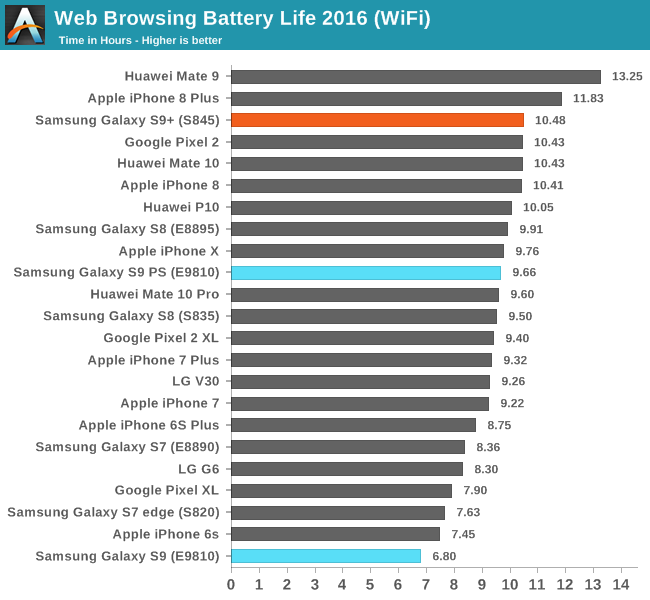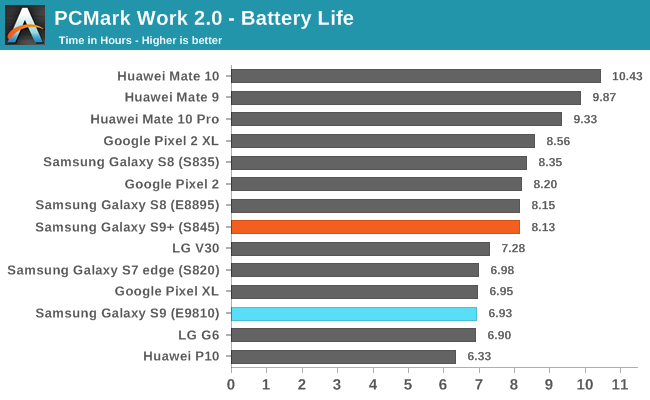The Samsung Galaxy S9 and S9+ Review: Exynos and Snapdragon at 960fps
by Andrei Frumusanu on March 26, 2018 10:00 AM ESTBattery Life - A Stark Contrast
We extensively covered the performance of the Snapdragon and Exynos Galaxy S9’s – what remains to be seen is how that performance affects battery life in our standard tests. Performance between the regular and larger Galaxy S9 doesn’t change, however battery life may differ based on the variant as the regular S9 sports a 3000mAh (11.55Wh) battery versus the 16% higher 3500mAh (13.47Wh) of the Galaxy S9+. Naturally the 14.2% bigger screen area of the S9+ offsets some of that advantage.
Unfortunately for this review we couldn’t get identical variants of the different SoC Galaxy S9s – our S9+ is a Snapdragon 845 unit while our S9 is an Exynos 9810 unit, so we weren’t able to execute a true apples-to-apples comparisons between the SoC variant, however as we’ll see the delta between the units is large enough that it won’t change the conclusion.
Our web browsing test tries to mimic real-world usage patterns of browsing websites. This includes iterating through a list of websites and scrolling through them. In this test, screen efficiency and battery size play a role, but also we balanced it so that it also sufficiently stresses the SoC (CPU, GPU and display pipeline) as well.

The Snapdragon 845 Galaxy S9+ posted excellent battery life in our test and lands only third to the iPhone 8 Plus and the Mate 9. Unfortunately we never tested the S8+ to see the generational difference, but it shouldn’t be too different from the S835 regular S8 at around the 10 hour mark.
The Exynos 9810 Galaxy S9 absolutely fell flat on its face in this test and posted the worst results among our tracking of the latest generation devices, lasting 3 hours less than the Exynos 8895 Galaxy S8. This was such a terrible run that I redid the test and still resulted in the same runtime.
I investigated the matter further to try to see if this was caused by the high energy usage of the M3 cores – and it seems it is. Enabling the “CPU limiter” (S9 PS result in the graphs) which is found in the battery optimisation options of Samsung’s firmware greatly throttles the M3 cores down to 1469 MHz, memory controller to half speed and also seemingly changes some scheduler settings to make them more conservative. This results in peak performance equal to the Exynos 8895- however the scheduler alterations also noticeably slow down UI responsiveness so it’s actually a worse experience. Nevertheless, backing off on performance results in regaining almost 3 hours.
This is such a terrible battery performance of the Exynos 9810 variant that it again puts even more clout into the new SoC. My theory as to why this happens is that not only do the higher frequency state require more energy per work done than competing SoCs – because this is a big CPU complex there’s also lots of leakage at play. The DVFS system being so slow might actually be bad for energy here as we might be seeing the opposite of race-to-sleep, walk-to-waste. The fact that Apple’s SoCs don’t have any issues with battery life in this test showcases that it’s not an inherent problem of having a high-power micro-architecture, but rather something specific to the Exynos 9810.

In PCMark the disadvantage of the Exynos 9810 S9 isn’t as pronounced as in the web test, however it’s again a regression to the Exynos 8895 S8 – all while not posting a meaningful performance advantage over its predecessor that might explain the lower battery life.
The Snapdragon 845 Galaxy S9+ fared relatively well, even though it’s not quite as good as other devices.
In my personal every-day usage I can’t saw that I noticed a massive disadvantage in battery life on the Galaxy S9, however my everyday usage is relatively light and I haven’t had enough time with the phone yet as a daily driver to make a final judgment. I did notice that the Exynos 9810 does shows signs of suffering in heavy tasks. Instances of Gmail syncing my inbox with a new account did once result in a warm phone while the Snapdragon 845 Galaxy S9 did not showcase this characteristic.
I can’t fault the Snapdragon S9+ in the time I had it, but again I haven’t had enough real time with it to really judge it subjectively. As far as AnandTech testing goes, the data speaks for itself and based on what I’ve seen I strongly do not recommend the Exynos variant of the Galaxy S9 in its current state, especially if you’re a regular user of heavy apps.
Over the coming weeks I’m planning to try to dive into the workings of the Exynos 9810 and post a follow-up article on whether it’s possible to improve both in terms of performance as well as battery life if one changes the way the SoC’s scheduler and DVFS works. In the eventuality that Samsung updates its firmware to resolve these large issues with the Exynos Galaxies, then we’ll revisit the matter as soon as possible.










190 Comments
View All Comments
madnav - Tuesday, April 3, 2018 - link
This review is not really meant to serve as a comparison between other android phones. This review (or rather analysis) is to show how each SOC OEM has progressed over years; and how the actual implementation in products turn out.Some of us appreciate this level of technological attention to underlying details; irrespective of whether the information affects end user or not.
For "avg day-to-day usage" i think no one really needs to spend on devices above $200 today. A person spending top money will want to know that the product was built with top quality and latest technology feasible; and that is exactly what analysis like this brings to its readers.
Kehboz 2943 - Tuesday, March 27, 2018 - link
I Just upgraded from a Droid turbo 2 to a Google pixel 2 XL I compared it to the S9+ when I asked the salesman what he used he said he liked the pixel 2 XL over the S9+ and he said the pixel 2 XL was cheeper in price my carrier is Verizon I've never owned a Samsung anything so I just took the salesmans word for it I can't tell if I made the right choice. If anyone has compared the two or would like to comment I welcome the feedbacklilmoe - Tuesday, March 27, 2018 - link
It's been a while since we got a PRO review. Thank you very much Andrei, best stuff as usual.Anyway, yes, best phone with best features. I'll recommend the device to family and friends, but I won't touch it myself. I knew this won't be changing in production units, but I'm totally disappointed in the default scheduler settings. Samsung is losing a LOT of PR with how much they're holding back this monster version of Exynos. No, feature and performance parity with Snapdragon is NOT acceptable. I thought they'd stop being too damn conservative with ramping up clocks. This is totally unacceptable from an enthusiast perspective. I also thought they'd be upgrading the UFS Nand storage, not the case, also disappointing.
Sigh.... Oh well. Until when, Samsung???
tuxRoller - Tuesday, March 27, 2018 - link
Perf parity? If they were aiming for that they did a piss poor job.madnav - Tuesday, March 27, 2018 - link
@Andrei FrumusanuCan this article be updated with the details of the FW that S9 and S9+ were running? (FW and date/month of FW)
It will help readers track how long it actually takes Samsung to fix the scheduler.
julandorid - Tuesday, March 27, 2018 - link
What is the reason for comparing the smaller model S9 Exynos with the bigger brother S9 Plus Snapdragon?In my opinion there are too many differences for this years models that can cause 5-10% difference or even more just because of the different performance plans, scheduler, thermals and thus the whole performance behavior, not to mention the extra 2GB that also could affect the overall performance between S9 and S9+ and thus Exynos in S9 and SD in S9+.
phoenix_rizzen - Tuesday, March 27, 2018 - link
Because that's what they were given by Samsung or able to source locally? It's mentioned right in the article that they tried to get the same SoC version in each size but were unable to.ctchb - Tuesday, March 27, 2018 - link
Can you compare the camera image quality and speed of snapdragon vs exynos? Their ISPs are different, and this is a big factor of camera performance.nedooo - Tuesday, March 27, 2018 - link
Amazing review, more like scientific analysis.I am surprised to see Snapdragon 845 bases its power advantages over 835 is "smoke and mirrors" short unsustainable bursts. But maybe "always on" laptops will fully utilize its power...
warrenk81 - Tuesday, March 27, 2018 - link
Great to see AT going back at flagship devices. Could you compile all those benchmarky bits of the 2017 devices into a recap or something? Apple and Google both shipped big new things in 2017 that guys just ignored.